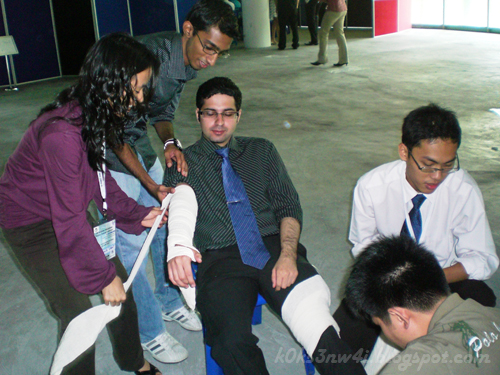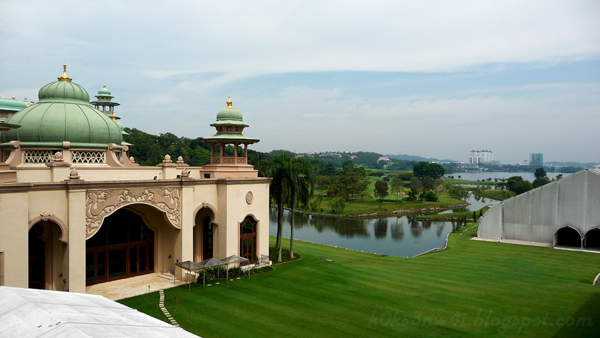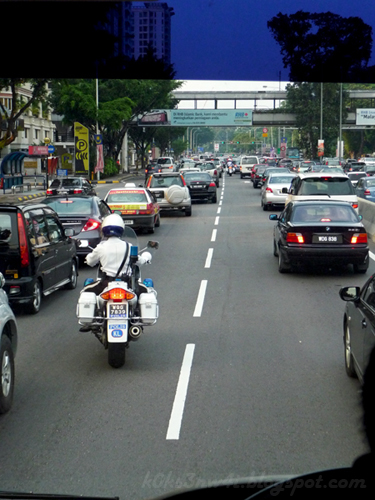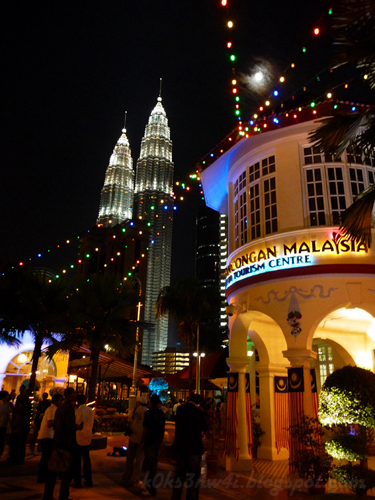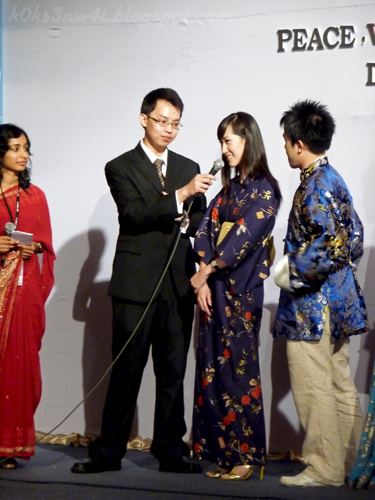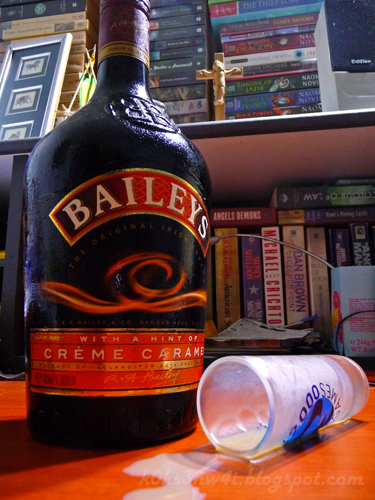"A drug is that substance which, when injected into a rat, will produce a scientific report."Author Unknown
Yeah, that's pretty much it.
As you all know, I was at the 1st Malaysian International Medical Students' Conference (or if you like acronyms - the MIMSC 2009) a week ago and on Tuesday, I wrote an informal coverage of the whole affair focusing only on the unimportant motes and motleys. Now, if you remember, I promised to pen a slightly more academic review of said conference in that previous post... so surprise, surprise! I'm actually making good on my promise for once! Summon the heavenly choirs and break out the 'lectric guitars, cuz' this one post escaped the oblivion of my all-consuming Draft Folder!
I learned from an inside source that the entire conference was supposed to be held within the confines of the Palace of the Golden Horses, where all the participants were housed, but they hit a bit of a budgetary glitch with that plan, so the scientific presentations, the plenaries and the workshops in toto were conducted in the nearby International Medical University campus instead - which, as of last August, is my sister's school.
According to the excellent and very helpful conference book they gave every participant, they have scheduled 38 slide-show/oral scientific presentations by contesting medical students on Saturday, divided into three concurrent series. The keywords here are "contesting" and "divided into three concurrent series".
Yes, it was a contest; a rigidly-timed rigmarole arbitrated by three judges of respectable research repute. Now, I may be wrong on this but I feel - and I feel strongly - that 8 minutes of jumping through hoops dictated by scoring schema don't make for very thorough and effective research expositions. One contestant from Saudi Arabia, Aws Saad AlMufleh, lamented to me that he had to prune large chunks of his PowerPoint presentation in order to fit the time-frame, rendering some parts quite unintelligible. As he had exceeded his pittance of 8 minutes of talky and 2 minutes of Q&A, I had to approach him after the session to quiz him further about his study on behavioural risk factors amongst youths, which I found fascinating but oddly truncated. You see, I came to this conference with the express goal of actually imbibing the contents of the the medical students' research papers, not to watch how neatly they can compress it down to less than one-sixth of an hour. I came for the substance, not the form (which is very important to some people, I'm sure). 20 or even 15 minutes would have been a more reasonable and manageable allotment, and we would all be richer for it. Although if I had my way, I'd do away with the whole contest format altogether.
The other BIG problem was that the presentations were "divided into three concurrent series", each taking place in a different auditorium. This meant that a person would have to move between the venues if the talks they wanted to catch were inconveniently peppered across the three threads. Then, there was also the probability of those talks overlapping with one another, forcing that person to choose and attend just one. Two of my colleagues from our delegation had papers to present and they were scheduled back to back in different auditoria. I sympathise with the bloke who had the floor right after our first colleague completed her presentation. I mean, the moment he stepped up to the rostrum, about two dozen people stood up and egressed the room.
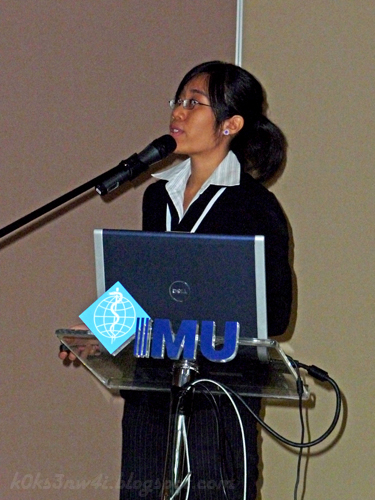
Miss Chow Lai Yin did a speaky on her study of stress levels amongst medical undergrads.

Mr Sanjeev Kumar Pugazhendhi passionately declared that he has a dream.
We actually missed the first half of Sanjeev's presentation, which is a bummer especially for me since I stayed up till 5:30 am helping the man prep for it - and let's not forget to figure in that one whole night's sleep I've already forfeited at this point to swot for my Community Medicine end-posting exam which was conducted in the morning before I board the college bus to this conference 2-hours away in K-fucking-L. Let us not even talk about how I have to wake up almost immediately at 7:00 am to get myself ready for that morning's agenda.
There was so many presentations I wanted to listen in to but could not. There's that one on the Effect of Shift Work on Psychological Stress, Sleep Pattern and Health of Nurses in Riyadh by a Saudi Arabian delegate which sounded highly applicable to all of us. Then there's that piece on the Influence of Ramadan Fasting on Calory Intake of Housewives in Pulogadung District, Jakarta by our largely southern neighbors. My mate, representing IMU, was going to talk about house dust mites and childhood asthma in a third auditorium but I had to give him a pass in favour of Lai Yin and Sanjeev's slots. And, I'm sure all of us felt like we were missing out on something truly

Depicted above may or may not be Ms Auhood Salem (it's quite hard to tell for sure) who bagged one of the runner-up positions for her concise presentation on the
The conference bolsters an atmosphere of scholarship which I find sorely and strangely lacking in the education mills we call universities here in Malaysia. I find that the majority of Malaysian U-goers have very claustrophobic focuses and approaches to their studies; a sort of "if it ain't coming out in the exams, it ain't worth learning" mentality. The very few foreign delegates I have had the pleasure of talking to are a whole breed apart. They aren't merely students, no - they are real academes with a certain esprit de la Renaissance clinging about them. One of the Saudi Arabians surprised me with his in-depth knowledge of Malaysian racial politics and was deeply curious about our unique social structure, asking me many questions pertaining to it. He told me that he greatly admire our harmonious ethnic relations, in spite of the unfortunate circumstances. He said and I quote, "If I am not Saudi, I wish to be Malaysian."
That made me want to tear up, a little. I don't think we notice it very often but for the very first time, in that hall, I saw Malaysian medical students of every ethnicity sitting all hodgepodge together, showing not the slightest inkling that they realise this simple but powerful innate sense of belonging. Then, I noticed that Ezyana was sitting beside me at the time and wondered if I have ever seen her in in the context of her Malay ancestry at all. I don't think I have.
Ah, got a bit sidetracked there, didn't I?
Another member of the Saudi Arabian delegacy, Aws, have recently traveled to Chang'an (present day Xi'an), Beijing and Shanghai and we were exchanging tales and thoughts on Chinese culture, history and monuments. He was in the middle of divulging his thoughts on Communism when the dumb ice-breaking games interrupted us during our first dinner together. I would certainly like to have followed that thread of conversation to conclusion.
One of the highest-points of the conference were the plenary sessions when they had genuinely distinguished guests to speak to us. The first of them was Dato' Dr Ronald S. McCoy, a founding member of Malaysian Physicians for the Prevention of Nuclear War (MPPNW) and its President and also Co-President of International Physicians for the Prevention of Nuclear War (IPPNW), a federation of 83 national physicians' groups, representing 200,000 doctors worldwide and dedicated to the elimination of nuclear weapons. He disserted on the role of a doctor in times of peace and war and on a doctor's responsibilities in political issues ranging from nuclear apocalypse to the environment - the latter of which is a cause I champion and hold quite dear to heart myself. While I disagree with him on nuclear power plants, which is possibly the best energy source we have now to temporarily substitute fossil fuels and to abort the escalation of anthropogenic global warming, I find his doomy speech of doom to be quite an enlightening experience. I was fortunate enough to speak with him privately after his talk (which is to say I cornered him and bugged him with my inanities) and we very briefly discussed the urgent need for clean alternative power apart from nuclear fission, and environmentally-sustainable housing and skycrapers.
"Oh, like the sort designed by "Dato' Dr Kenneth Yeang?" I commented.
He beamed at me and said, "Yes, exactly."
Boy, I feel smart. Never mind that the only reason I know Dr Ken Yeang is 'cause he's Beve's dad.
The 2nd plenary speaker was the equally illustrious Mr Youssouf Mohammad Oomar, an economist, diplomat and accomplished singer (or so I heard) who heads UNICEF Malaysia and had served years in many troubled regions around the word. Also, he is a native of Mauritius and spoke with a rich, pleasant French-tinged voice. His topic of choice was mainly on women and children in conflict zones, and on the Rights of the Child. Now, while he was a less mechanical orator compared to Dr McCoy, I found the content of his speech to be ever so slightly less engrossing. The majority of my colleagues disagree though.
One question though: just where did the organising committee of this conference pull enough clout to summon these heavies for the plenary sessions? I must say that I was well and bloody impressed by it all.
The last plenary was hosted by Dr Mahadevan Deva Tata, while also having quite substantial a list of fame to his name, spoke to us mainly in his capacity as the Area Commander of Port Dickson for St John Ambulance, Malaysia. While possibly the least resplendent and engaging of the 3 plenary speakers (due to his lack of an English or French accent, probably), what he lacked in high ideals and decorated language he made up for with solid practicality - as the subject of his discourse is disaster care and first aid, something medical students are ironically crappy at due to a lack of exposure in their curriculum. The title of his talk, Disaster Care: An Inconvenient Truth, could have been a little less, er, plagiaristic and irrelevant though. Just sayin'.
The last day of the conference was mainly comprised of the workshops. There's one on suture materials and suturing techniques by the B Braun folks, who are suppliers of healthcare products like - yeap, you guessed it - sutures. For some reason, I thought they made toothbrushes. While I was only taught the simple interrupted stitch back in 2nd year, the workshop covers a wider range of techniques, including the running stitch and the figure 8 stitch, and pontificated generously on the differences between a granny and a reef/square knot (which I wished my instructor had). While the workshop was dead useful, a lone hour simply wasn't enough time for many people to pick up even the basics, and factoring in the limitations of having to share suture sets in duos simply worsened the time constraint. I defy anyone to try and master the one handed tie in just 3 minutes after only watching a 30 seconds long video clip. Go ahead. I'll wait.
There was a total of 4, maybe 5 workshops and everyone was cycled through all the stations mechanically in accordance to a strict schedule. If you thought that the allotted time for the suturing workshop was miserly, you'd be aghast to know that the same amount of time was divided across the remaining 3 workshops; transportation of injured patients, fracture immobilisation, and the chest tube and central IV line insertion combo. Again, all the workshops are quite fun and I believe also, quite essential in augmenting our repertoire of medical know-hows. The problem there wasn't enough bloody time to do any one of them justice!
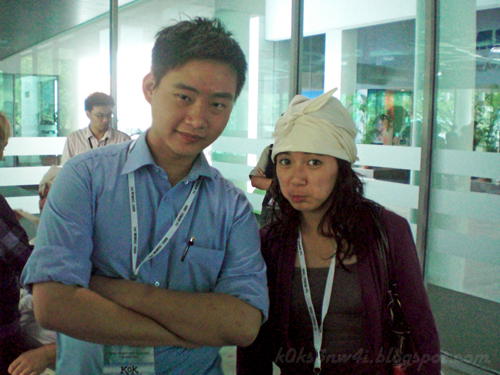
Ezyana in a very inexpertly tied triangular bandage for head compression by yours truly, the resident inexpert himself.
The penultimate event which preceded the closing ceremony was the so-called Open Forum which carried the modifier of An Integrated Approach Across the Globe to the Panoramic View of Medicine which contained a lot buzzwords like "integrated" and "panoramic view" - which I detest almost as much as I detest words like "proactive", "synergy and "paradigm shift", but that is wholly a matter of personal preferences. I only participated in one segment, which is the one on medical ethics. The short of it is, someone brought up euthanasia, and Aws, in his turn, said that the guidance of religion should be paramount in this issue: the life belongs to God and not to men, so therefore, to perform euthanasia or to receive it is sinful. This was the point I got interested in the forum. What I basically argued is that religion has NO place in medical ethics whatsoever. Zero. Nada. Nil. Zilchville. The whole idea of life being sacred to a deity is purely a theological viewpoint and it should be kept out of medicine the way faith healing and the demonic theory of disease is kept out. I find it ridiculous that there are even laws restricting a person from committing suicide in the face of insurmountable suffering and at the nadir of living quality, considering that not everyone buys into the whole "whoopsie, soul belongs to Guy upstairs" deal. This is basically forcing a religious idea onto everyone. It's unconstitutional and is plain wrong. When your cat or dog is at its life's end and are in pain, you would take it to a vet to be put to sleep, wouldn't you? All I expect is that the same kindness be given to me when my turn comes.
The moderator of the forum responded by saying something like, "I feel very strongly about patient autonomy but we also have to consider everyone's culture and beliefs." Pure 100%, unadulterated, freshly-squeezed, soundbite, straight from the fruit. I don't blame him though. The debate was veering dizzily onto highly controversial terrain and apparently addressing the really hard questions wasn't in the forum's integrated panoramic view of purposes.
Aws spoke a second time, this time narrating how the guidelines of medical ethics of his country was form from a hybrid of teachings from philosophers and religious leaders while skirting the points I made completely. After that, the moderator closed the segment due to time constraints (again) and the forum plodded harmlessly forth on
Naturally, I continued the debate with Aws off-mic and he conceded that he simply could not think of a justification for forcing a particular dogma on people who do not believe in the religious institution which birthed said dogma - which was why he did not address my argument publicly. I suddenly found him immensely likeable.
That's pretty much the chief bug of the entire MIMSC wasn't it: a ruinous, detestable poverty of time. The blitz of workshops, the bite-size integrated panoramic forum, the 8-minute-apiece scientific presentations, divided into 3 concurrent series... it pretty much put a bit of a damper on an otherwise monumental medical students' conference (though I admit my experiences are woefully limited on such matters).
Let me just put it out here that I would most certainly sign up for next year's MIMSC if I have the time and chance (and if I'm allowed back, of course). It was certainly one of the most agreeable and enlightening weekends I have ever participated in. Sure, our delegation didn't win any position in the scientific paper presentation contest, but neither did the fellas from, er... Monash! Yeah! Boy, they really sucked, didn't they? We did at least dominated the ice-breaking games and bagged first prize for the best traditional dress pageant.
There you have it: a serious as a heart attack review of the 1st MIMSC, 2009. Now, I shall go crash into my bed hard. I've stayed awake for the past 36 hours and honestly, I worry that I might two brain cells left to rub together tomorrow if I stay up any longer.
Goodnight, readers.
P.S. The bit about Monash sucking is a total joke. If they suck, we suck equally because both delegations didn't win the... Look, if you need me to explain this, you really shouldn't be allowed on the internet at all.
P.P.S. Will correct typos and grammatical errors when I regain consciousness. Right now, I'm seven different kinds of whacked.
Like seriously yours,
k0k s3n w4i



